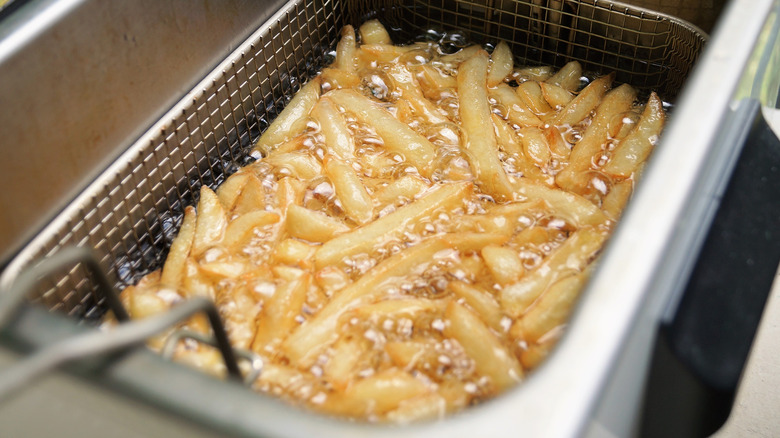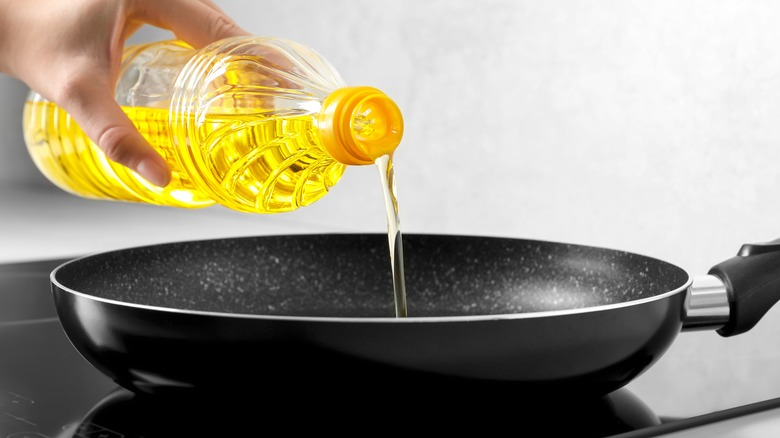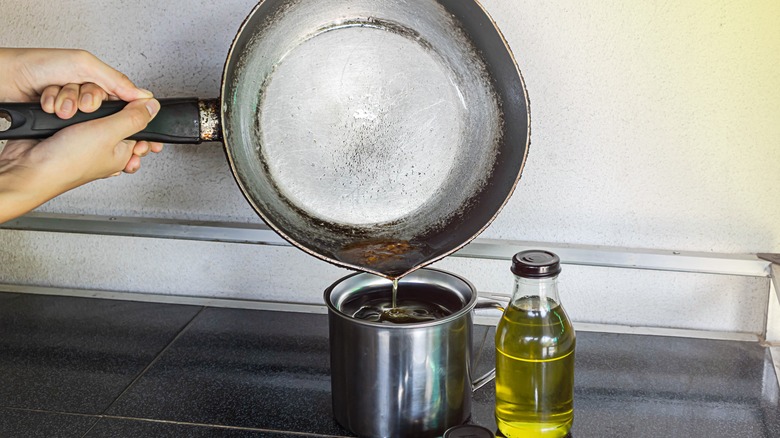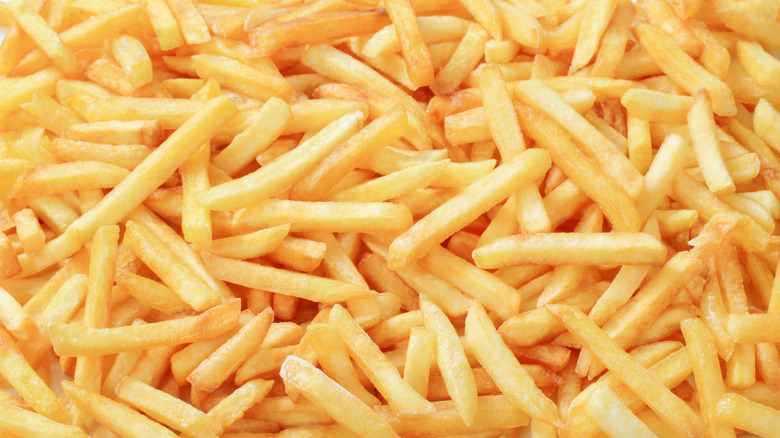Which Oil Should You Use To Make French Fries?
Without a crisp exterior and pillowy-soft interior, a french fry wouldn't be a french fry at all — a soggy and disappointing stick of limp potato, is more like it. Achieving restaurant-quality, crispy fries too isn't complicated, but the deep-frying process can be intimidating. You can save yourself a lot of trepidation simply by choosing the right oil. More specifically, you want a neutrally-flavored oil that can withstand high temperatures.
Fries can only gain a perfectly crisp crust in oil that's hot enough to rapidly evaporate the potatoes' external moisture, creating a dehydrated outer layer that's delightfully crunchy. You might guess that colder oil creates limp, greasy, lifeless fries, but hotter isn't necessarily better. Heat up certain kinds of oil too much, and the potatoes will burn to a char before they cook through. The oil should be between 350 and 375 degrees Fahrenheit, and not every type can withstand this high heat without burning.
To make a good choice, look at the oil's smoke point, or the temperature at which it will start to smoke and burn. Some oils have very low smoke points that aren't suitable for deep-frying, while others, such as vegetable oil, have higher smoke points of 400 to 450 degrees Fahrenheit. In fact, vegetable oil might be the best widely-accessible choice for fries, striking a balance between affordability and effectiveness.
Why you should use vegetable oil for french fries
If you cook french fries in oil with a smoke point below 350 degrees Fahrenheit, you risk degrading and breaking down the oil, adding an unsavory burnt flavor (as well as setting off your smoke alarm). Vegetable oil's smoke point far exceeds the temperature required to deep-fry most foods. It's one of the most heat-stable oils that you can pick up at any grocery store, and it also doesn't add any distracting flavors.
Many oils have a distinct flavor of their own, and while fruity olive oil or nutty sesame oil are appreciated in other recipes, you might not want your fries to taste that way. Vegetable oil is pressed from ingredients without strong flavors — think soybeans, canola seeds, and sunflower seeds — then refined in a long and thorough process that strips away odors, bitterness, and other distracting qualities. It winds up with a completely neutral flavor that allows the simple, savory, salty taste of french fries to shine.
Several fast food chains make their famous fries using vegetable oil, such as Burger King and McDonald's. The former uses canola, corn, soy, and cottonseed oils, whereas the latter uses canola, soybean, and corn oils. You don't have to get quite as specific with blending oils in your own kitchen — a generic bottle of vegetable oil will do a great job.
Other oils you can use when making french fries
Vegetable oil ticks a lot of the right boxes for making the best french fries, not to mention it's very affordable to use in large quantities. An average bottle contains a blend of oils from different plants, depending on which crops are the cheapest to process. If you'd prefer a more "pure" oil, try springing for any refined oil with a high smoke point. Pure canola oil, with its 400-degrees Fahrenheit smoke point, is an excellent option, as are sunflower, corn, safflower, and soybean oils.
If you don't mind doing a little more searching while you shop, consider seeking out peanut oil. This oil is favored by fast food chains like Chick-fil-A and Five Guys, and is lauded for its high smoke point, exceptional crisping properties, and slightly nutty and rich flavor. Food Republic's own french fry recipe calls for peanut oil, so you can taste the goodness for yourself.
You could also try refined avocado oil, which is packed with healthy fats and nutrients and has an even higher smoke point than vegetable oil, at an impressive 520 degrees Fahrenheit. However, priced as much as 50% higher than already-expensive olive oil, avocado oil is one of the most expensive oils to cook with, especially when used in large quantities for deep-frying. Still, it can be an appealing choice for health-conscious folks who want a few nutrients to go with their fries.
What to do with leftover frying oil
So you've picked the right oil, crisped up a batch of fries to perfection, and devoured the spoils of victory — now, what can you do with the pot full of leftover oil? A lot, actually. The oil used to make fries — or any deep-fried foods — can be reused at least twice, and as many as eight times if properly cooled, strained, and stored. Follow a few easy steps, and you can use the same oil to whip up more steaming-hot fries the next day.
To store leftover oil, let it cool completely before straining it through a sieve or a cheesecloth. Transfer the oil to a clean jar and store in a cool and dark place. You can keep reusing the oil until it darkens in color, its texture turns gritty, and/or it takes on a rancid odor. It might also smoke and foam when heated up, signaling that it's time to toss it.
When disposing of oil, never pour it straight into your trash bin, as this can form a breeding ground for pests. And the adage that you should never pour oil down the sink is not an old wives' tale — it can end up badly clogging your pipes. Instead, pour the oil into a disposable container, refrigerate or freeze to solidify it, then toss the whole container into the bin. This method is far neater than just pouring oil right into the trash.
Oils you should never use for french fries
Checking a specific oil's smoke point can tell you if it's a good choice for fries, but to save yourself some time spent researching, just avoid unrefined oils. Examples include flaxseed, coconut, walnut, sesame, and some extra virgin olive oils. These choices have considerably lower smoke points, and usually cannot withstand the deep-frying range of 350 to 375 degrees Fahrenheit. Still, you might be tempted to use unrefined oils because you've heard that they're more nutritious. This is usually true, but when heated beyond their smoke points, these oils' nutrients will diminish, while the taste turns unpleasant and bitter.
Unrefined oils also tend to have stronger flavors to begin with. Unless fries with a hint of earthy walnuts or tropical coconut tickle your fancy, refined oils are the way to go. The more nuanced flavors and plentiful nutrients in unrefined oils also typically come with a higher price tag, so using them to fry foods is a waste of flavor, nutrition, and money. Vegetable oil or any other neutrally-flavored, refined oil will never do your french fries wrong, so don't be tempted to mess with perfection.





